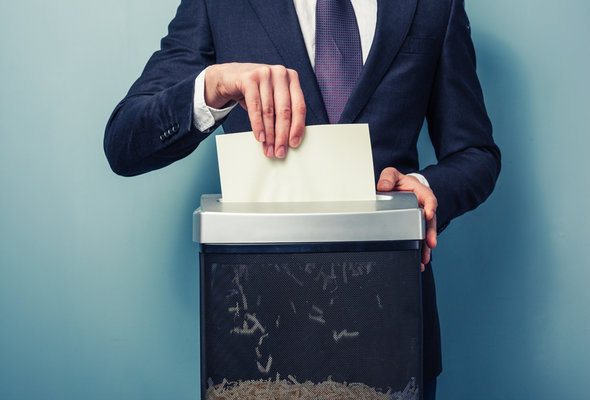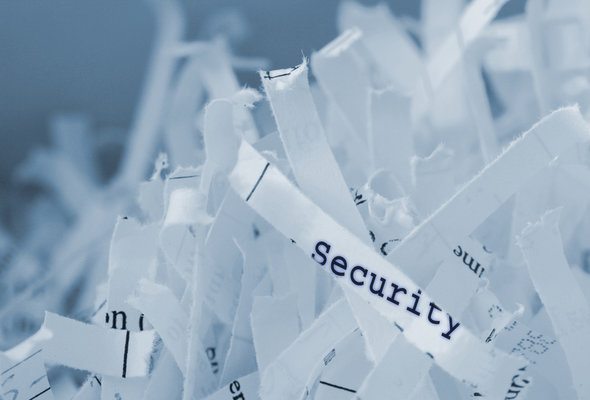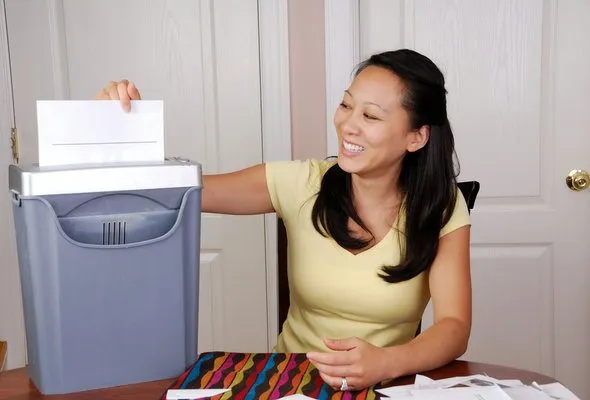
Even if you’ve opted to go paperless on things like bank statements, you probably still receive important mail related to your finances. These could be medical bills, old tax returns or explanations of benefits from your insurance companies, for example. So how do you know which documents you should shred? Take a look at our guide.
1. Old ID
Your birth certificate and Social Security card are two documents you’ll want to keep in a safe place forever. And if you’re like most Americans (though not all) you have some form of ID that you’re currently using, such as a driver’s license or passport. But what about old forms of ID including expired passports and driver’s licenses? Shred them. Even if they’re expired or the address is out of date they could still be useful to an identity thief.
2. Old Cards

Debit cards and credit cards that you’re no longer using should go in the shredder. If you close a bank account, once you get confirmation that the account has really been closed and you’ve transferred the money to a different account (or wiped the account), you should shred the card(s) associated with that account. The same goes for expired cards, since they often have the same number as your new card, meaning that all an identify thief would have to do is crack the expiration date and security code – a much easier task than hacking the card number itself.
Check out our credit card calculator.
3. Medical or Banking Information That’s Over a Year Old

If you ever have to prove your identity – such as to get a driver’s license or register to vote, it may help to have a bank statement with your name and address on it. Bank statements and credit card bills are an easy way to show proof of address, especially if you pay your utility bills online and can’t use a utility bill to prove residency. However, there’s no need to hoard banking documents that are over a year old. The same goes for medical bills and communication with your health insurance company. After a year, unless you’re in an ongoing dispute over coverage or bills, you can shred those documents, too.
4. Tax Information That’s Over 7 Years Old
If you’ve been saving receipts from charitable deductions or other tax-related documents in case of audit, remember that you can shred anything that’s over seven years old. If you really think you’re an audit risk (you have complicated business dealings, you’re very wealthy, etc.), you might want to double-check with your tax lawyer before you shred anything tax-related.
5. Other Documents That Contain Personal Information
Any document that’s not a must-keep item like a marriage license or car title should be shredded if it has your bank account information or Social Security number on it. Some people like to shred anything with their address or phone number on it, even if it’s just a catalog.
Bottom Line
Certain documents, like your will and the deed to your home, are obvious keepers. Others you can keep only the most recent version of – like statements from your retirement plan. But if you’re feeling overwhelmed by the volume of paper in your home, it’s comforting to know that there are plenty of documents that can go in the shredder and then into the recycling bin.
Update: Have more financial questions? SmartAsset can help. So many people reached out to us looking for tax and long-term financial planning help, we started our own matching service to help you find a financial advisor. The SmartAdvisor matching tool can help you find a person to work with to meet your needs. First you’ll answer a series of questions about your situation and goals. Then the program will narrow down your options from thousands of advisors to up to three registered investment advisors who suit your needs. You can then read their profiles to learn more about them, interview them on the phone or in person and choose who to work with in the future. This allows you to find a good fit while the program does much of the hard work for you.
Photo credit: ©iStock.com/lofilolo, ©iStock.com/© hfng, ©iStock.com/Nancy Honeycutt